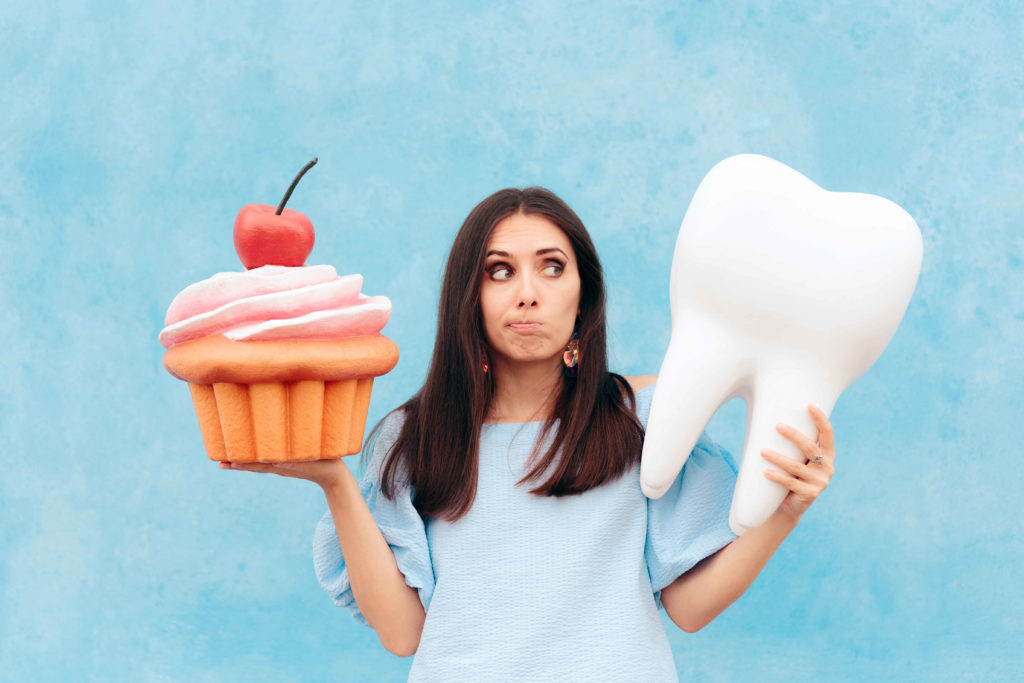The mouth is the body's first point of contact with the food we eat. Teeth are used to chew food before swallowing. This is the first step in the digestion process. What's the relationship between diet and dental health? Discover the Helvident team's advice on how to take care of your oral hygiene by making the best choices.
The principles of good nutrition
All doctors agree that it is necessary to adopt a healthy, balanced nutrition on a daily basis. Our meals must include :
- Fruit and vegetables: 50 % of the nutritional intake at each meal. Three portions of fruit and two portions of vegetables should be eaten every day;
- Fats: 30 % maximum of caloric intake. Increase consumption of unsaturated fats (found in fish, nuts, olive oil) and reduce foods rich in saturated fats (red meat, butter, palm oil, etc.);
- Protein: the recommended protein intake is 10 to 15 %. Choose lean protein sources (beef, chicken, skinless fish) as well as eggs, seafood, beans, peas and legumes;
- Cereals: at least half of which must be wholemeal (oats, bread or brown rice);
- Enough water to stay hydrated.
It is essential to reduce your intake of added sugar (free sugar) to less than 10 % of calorie intake, ideally to less than 5 %.
Precise caloric and nutritional requirements depend on age, gender, level of physical activity and other health-related factors. In addition to diet, staying active is essential for good health.
The effects of snacking on teeth
L'World Health Organization recommends brushing your teeth after every meal. This prevents sugars and acids from coming into prolonged contact with the teeth. For healthy teeth, it's best to avoid nibbling between meals.
If you need something to eat between meals, opt for healthier options such as fresh fruit, cheese, yoghurt or low-salt nuts. As well as being good for your general health, these foods are good for the health of your teeth and gums.
The links between diet and dental health
In addition to good oral hygiene, a healthy diet plays an essential role in dental health. It helps prevent cavities, gingivitis, oral diseases and, in the longer term, dental erosion.
The foods and beverages you consume have a direct impact on your oral health. Here are some of the things that have an impact:
- The nutritional composition of food ;
- The combination of foods and the order in which they are eaten;
- Frequency of consumption of refined foods and sweetened soft drinks;
- The shape of the food (liquid, solid, sticky, etc.) ;
- Certain illnesses, such as gastrointestinal reflux disease and eating disorders, can increase the risk of heart attack. risk of cavities and weaken teeth.
Foods that damage dental health
An unbalanced diet is a major risk factor in the development of dental plaque and the onset of various pathologies: gum inflammation, tooth decay, demineralization of the enamel surface (dental erosion), etc.
Tooth-damaging foods include sweets and pastries. You should also avoid sweet foods that stick to your teeth, such as dried fruit. Acidic foods (tomatoes, citrus fruits, etc.) should be eaten in combination with other foods.
In terms of beverages, we find all the soft drinks, industrial juices, sugary drinks and alcohol. In our mouths, we find bacteria that feed on these sugars, releasing acids that promote the formation of plaque and cavities.
How can you reduce the risk of cavities?
Once we understand the links between diet and dental health, it's important to know how to reduce the risk of cavities. Here's our advice:
- Brush your teeth at least twice a day for two minutes to remove sugars and food particles from your teeth. It's best to brush after every meal;
- Reduce snacking between meals;
- Reduce the amount of sugar in your diet to a strict minimum;
- Include fruit, vegetables and still water in your diet. They all play a key role in your oral health.
HELVIDENT welcomes you to its dental centers in French-speaking Switzerlandin Lausanne, Aigle and Fribourg. Our team of dentists performs all standard and specialized dental procedures.

